The Ritz at rest: the hotels taking centre stage as Madrid's grande dame undergoes renovation
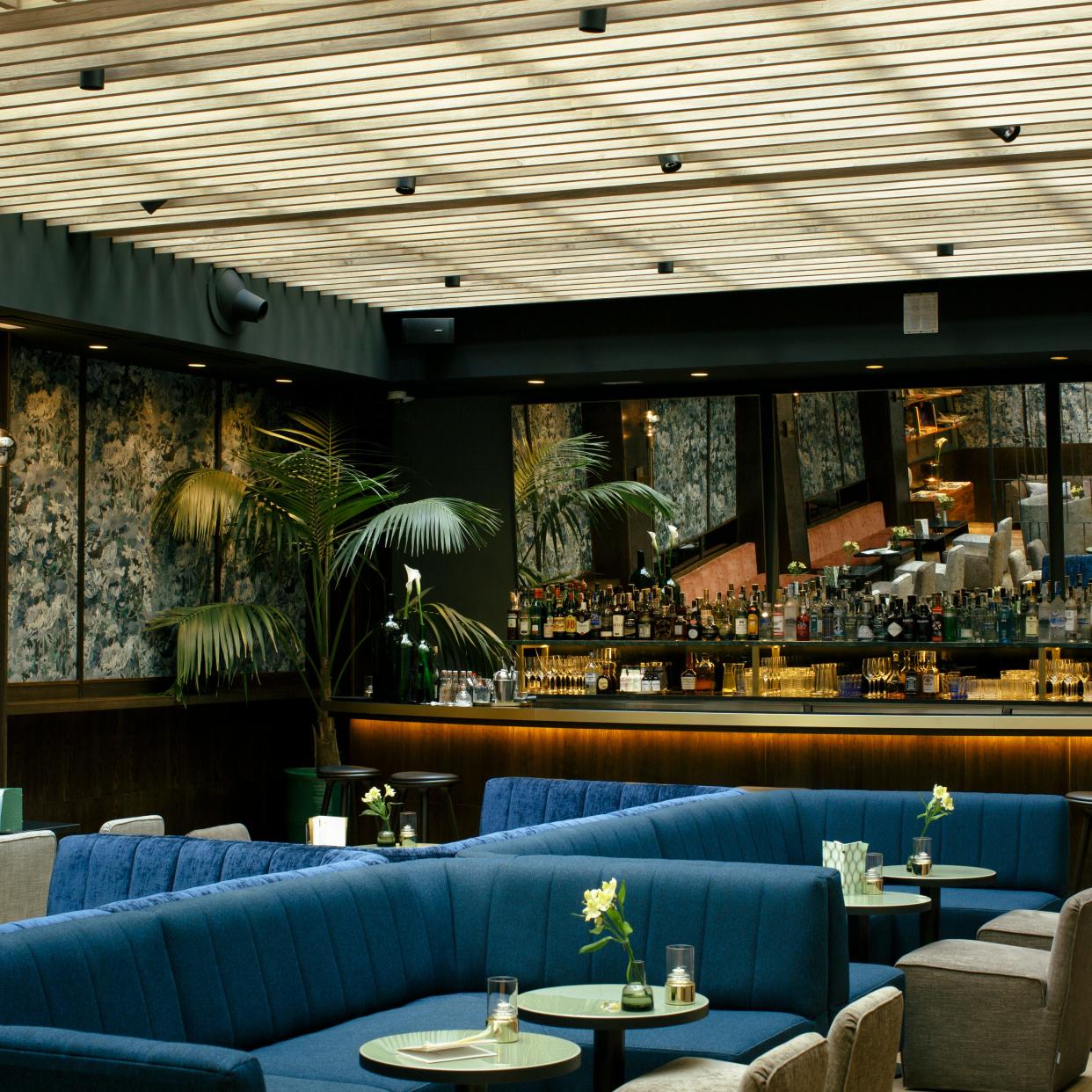
King Alfonso XIII knew how to do hotels. In 1926 the erstwhile monarch of Spain commissioned the first in what would later become (and still is) Spain's collection of paradors hotels – lodgings in historic buildings – across rural parts of the country. His name has also been forever cemented in the eponymous Alfonso XIII in Seville, a Mudejar-style palace, all endless azulejo tiles and minarets, that he built for the 1929 Expo.
His biggest legacy, though, is The Ritz Madrid. The king commissioned French architect Charles Mewes to design the hotel in 1908, when, after a grand tour of Europe, he realised the Spanish capital couldn’t match its stately counterparts when it came to grande dame accommodation.
What resulted was unparalleled in the city. The finest of fashions were selected: heavy-pile, richly patterned carpets woven in the local Royal Tapestry Factory (which have remained in place up until today); mirrors from Pereantón; china by Limoges. And the hotel fast filled its purpose, welcoming through the ages guests as star-spangled as Eva Perón and Madonna, Gabriel Garcia Márquez and Salvador Dalí (after whom a cocktail is dedicated).
More recently, fashion designer Jonathan Anderson, of Spanish heritage label Loewe,chose the hotel to serveas the base for the world’s foremost fashion names during the opening of the brand’s first native flagship.
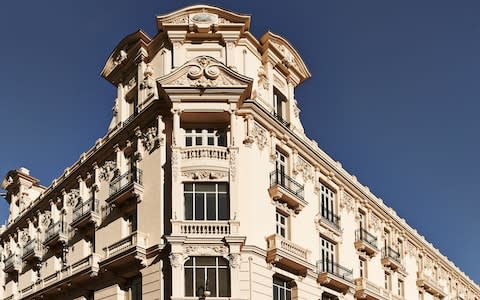
However, as of the end of February 2018, King Alfonso XIII’s first born has closed its golden ‘R’-adorned doors. The plan? A two-year, €99 million restoration project by the Mandarin Oriental group – the first in the city – which will include the reinstatement of a glass roof in the centre of the property, a basement spa and pool, and a royal suite which overlooks the Prado, the city’s eminent museum which houses numerous pieces by Goya and Velázquez.
The much-loved terrace garden at the front of the hotel will stay, while the restaurant will move back to its original site (it’s unclear as to whether Goya restaurant, which serves typical Spanish cuisine, will remain).
Until then, those who want to bed down in the lap of luxury have just a few options in the city. Urso Hotel & Spa is set within a buttercream-coloured neo-classical palace (matched by the colour of its doormen’s jackets) that was built around the same time as The Ritz. It has since been taken over by hotelier-designer combo Pablo Carrington and Antonio Obrador, of the Marugal group, also behind the decadent Cap Rocat in Mallorca; Akelarre, the quietly cool restaurant with rooms in San Sebastian; and Tótem, another address in Madrid.
Though Tótem is set in a beautiful former apartment building in the same neighbourhood as The Ritz, it’s more of a study in design hoteliering than out-and-out five-star luxury: think modish colour combinations – peach, navy, baby pink, canary yellow and emerald – and a buzzy cocktail bar.
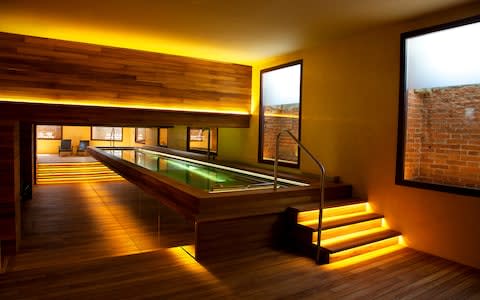
Urso, Marugal’s first Madrid outpost, is the one for those yearning after old Madrid. It is a modern-day paean to Spain. Japanese-influenced wallpapers in the lobby are based on a design found in the palace opposite, and the original mahogany lift and stained glass windows remain. Rooms, like at Tótem, are lessons in restraint, with a palette of bluey greys and creamy yellows.
A golden-hued Natura Bissé spa, with a hydropool, beckons in the basement, while headline restaurant Media Ración pulls in a local crowd.

Media Ración is a celebration of classic Madrilenian cuisine. Chef Fernando Cuenllas is the latest culinary innovator to bear the Cuenllas name. His forefathersopened the city’s first tapas bar in the 1930s. Cuenllas’ offering derives from traditional menus, served in the format of ‘half tapas’ (all the better for sharing): the likes of unctuous callos stew (beef tripe, chickpeas, sausage and bell peppers), artichokes with clams, and typical cod dishes such as crispy soldaditos de Pavía (fried, with peppers) and ajoarriero (cooked in a garlic and pepper stew).
Former patrons of the Goya at The Ritz won’t be disappointed. The vibe is also decidedly traditional, with proper napkins, monogrammed plates and table crumbers contrasted incongruously against waiters in New Balance trainers. It’s an apt allegory for Madrid.
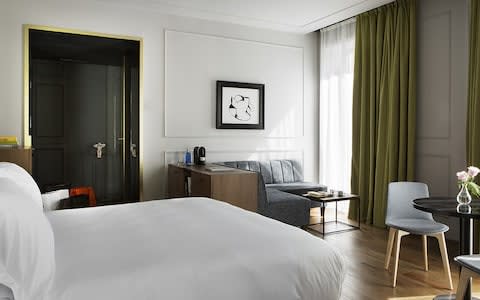
Picking where to stay according to where you want to eat is advisable. The Principal is a lofty, private club-like hotel situated in a grand Spanish Renaissance-style building floors above the Gran Vía, the city’s main thoroughfare. It feels more cosmopolitan New York than Madrid – until you get to ático, presided over by chef Ramon Freixa who holds two Michelin stars at sister Hotel único. Though the theatre of fine dining is employed here – intricate tableware, artful presentation and set menus – the dishes strip back classic Spanish ingredients to their bare basics.
You might be served simple baby cuttlefish croquettes or the usually heavy and un-chic Russian salad this time presented delicately inside a crispy wafer, alongside domestic classics – such as tomato bread with jámon or cod tortilla – enlivened by Freixa. Afterwards, you can retire to a calmingly neutral bedroom, or else enjoy the distant sounds of Madrid getting ready to party from the all-magenta rooftop bar.
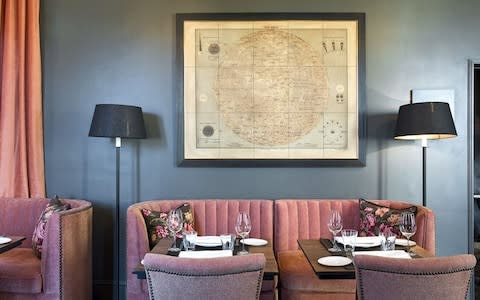
What these hotels share is an opulence which gently nudges rather than smacks you, much like the city of Madrid itself. Both young and old global hotel brands – such as Edition, Soho House group, Fairmont and, until now, Mandarin Oriental – have long eschewed the capital, opting instead for the Mediterranean sway and more obvious glamour of Barcelona.
It has meant that the growth of luxury hotels in the capital has been slower and more considered. It means that a simple tortilla or Madrilenian stew stays on menus. I don’t think King Alfonso XIII would have had it any other way.
The Ritz Madrid is closed for renovation until late 2019. Double rooms at Urso Hotel & Spa from €200 (£175); the Terrace Suite from €570 (£498), including breakfast. Double rooms at The Principal Madrid from €260 (£277).